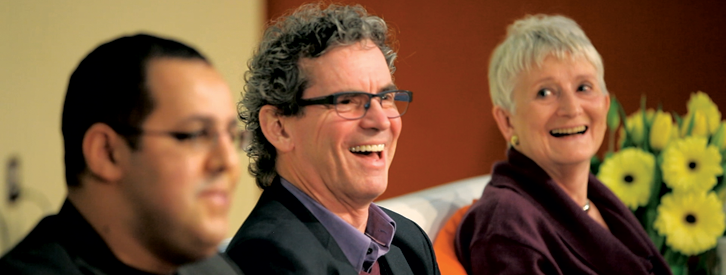2012 STEWARDSHIP PAPERS
Stewardship is widely defined as an ethic of responsible behavior and management of resources, typically in mixed or common pooled settings such as the environment. Cyberspace is increasingly seen as one of these mixed or common pool resources, which raises the question: What does it mean to be a “steward of cyberspace” as a government, a government’s armed forces, a company, an NGO, a social movement, an engineer, a hacktivist, or a citizen?
How should these actors behave in cyberspace? Do they have different roles as stewards? What should they do or not do? Where are the gaps? What is an appropriate balance? Do we need stewardship in cyberspace at all? And how does stewardship relate to strategy in cyberspace?
To explore stewardship and how it relates to cyberspace we have commissioned a special paper series with contributions from thought leaders in the field.
Christopher Bronk – A Governance Switchboard: Scalability Issues in International Cyber Policymaking
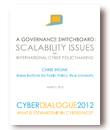 |
Christopher Bronk is the Baker Institute fellow in information technology policy. He previously served as a career diplomat with the U.S. Department of State on assignments both overseas and in Washington, D.C. Since arriving at Rice, Bronk has divided his attention among a number of areas, including information security, technology for immigration management, broadband policy, Web 2.0 governance and the militarization of cyberspace. He teaches on the intersection of computing and politics in Rice’s George R. Brown School of Engineering.
download PDF
|
Ron Deibert – Towards Stewardship in Cyberspace
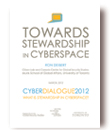 |
Ron Deibert (PhD, University of British Columbia) is Professor of Political Science, and Director of the Canada Centre for Global Security Studies and the Citizen Lab at the Munk School of Global Affairs, University of Toronto. He is a co-founder and a principal investigator of the OpenNet Initiative and Information Warfare Monitor projects. Deibert has been a consultant and advisor to governments, international organizations, and civil society/NGOs on issues relating to cyber security, cyber crime, online free expression, and access to information. He presently serves on the editorial board of the journals International Political Sociology, Security Dialogue, Explorations in Media Ecology, Review of Policy Research, and Astropolitics. Deibert is on the advisory boards of Privacy International, Access Now, and the Lake Ontario Waterkeepers.
download PDF
|
Sandro Gaycken and Felix FX Lindner – Zero-Day Governance: An (Inexpensive) Solution to the Cyber-security Problem
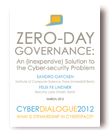 |
Sandro Gaycken is a researcher in technology and security at the Freie Universität Berlin, Institute of Computer Science. He is a graduated philosopher with a doctorate in technology research. The main focus of his research is on IT and society, involving topics like cybersecurity, cyberwarfare, hacking and hackers, surveillance and privacy, open source, hacker ideologies, information society.
Felix “FX” Lindner is the technical and research lead of Recurity Labs with 18 years computer technology experience, over ten years experience in the computer industry, almost all of them in consulting for large enterprise and telecommunication customers. He possesses a vast knowledge of computer sciences, telecommunications and software development. His background includes managing and participating in a variety of projects with a special emphasis on security planning, implementation, operation and testing using advanced methods in diverse technical environments.
download PDF
|
Franklyn Griffiths – Stewardship as Concept and Practice in an Arctic Context
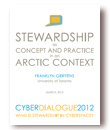 |
Franklyn Griffiths is a professor emeritus of international politics and the George Ignatieff Chair Emeritus of Peace and Conflict Studies at the University of Toronto, from which he retired in 2001. Policy analysis and advocacy have been and remain his lifelong professional priorities. He is currently writing a book on the incivilities of Western civilization.
download PDF
|
Melissa E Hathaway and John E. Savage – Stewardship of Cyberspace: Duties for Internet Service Providers
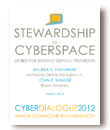 |
Melissa Hathaway is President of Hathaway Global Strategies LLC and a Senior Advisor at Harvard Kennedy School’s Belfer Center. Ms. Hathaway served in the Obama Administration as Acting Senior Director for Cyberspace at the National Security Council and led the Cyberspace Policy Review. During the last two years of the administration of George W. Bush, Melissa served as Cyber Coordination Executive and Director of the Joint Interagency Cyber Task Force in the Office of the Director of National Intelligence where she led the development of the Comprehensive National Cybersecurity Initiative (CNCI).
Dr. John E. Savage is the An Wang Professor of Computer Science at Brown University. He earned his PhD in Electrical Engineering at MIT in coding and communication theory and joined Bell Laboratories in 1965 and Brown University in 1967. In 1979 he co-founded the Department of Computer Science at Brown and served as its second chair from 1985 to 1991. His research has centered on theoretical computer science and currently includes cybersecurity, computational nanotechnology, the performance of multicore chips, and reliable computing with unreliable elements.
download PDF
|
Duncan B. Hollis – Stewardship vs Sovereignty?: International Law and the Apportionment of Cyberspace
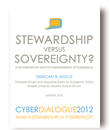 |
Duncan B. Hollis is a Professor of International Law and the Associate Dean for Academic Affairs at Temple University’s Beasley School of Law. Professor Hollis’s scholarship focuses on treaties and other forms of international agreement, asking how existing rules of international law regulate cyberthreats, the ways new norms could be formed to redress such threats, and what the content of such norms might look like.
download PDF
|
Roger Hurwitz – Taking Care: Four Takes on the Cyber Steward
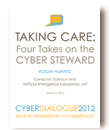 |
Roger Hurwitz is a Research Scientist at MIT’s Computer Science and Artificial Intelligence Laboratory (CSAIL), a senior Fellow at the Canada Centre for Global Security Studies at the University of Toronto, and a founder of Explorations in Cyber International Relations (ECIR), a Minerva Research Initiative program at Harvard and MIT. A Ph.D. in computational social sciences, with application to international relations and communication studies, his research and writing include modelling conflict escalation and de-escalation, Middle East politics, measuring information flows, content analysis and hermeneutics.
download PDF
|
James Andrew Lewis – Stewardship, Security, and Cyberspace
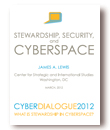 |
James Andrew Lewis is a senior fellow and Program Director at the Center for Strategic and International Studies, where he writes on technology, security and the international economy. Lewis received a Ph.D. from the University of Chicago; his current research involves the political effect of the Internet, asymmetric warfare, strategic competition, and technological innovation.
download PDF
|
Stefania Milan – When Politics and Technology Speak the Same Language
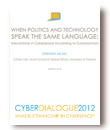 |
Stefania Milan studied communication sciences at the University of Padova, Italy, and holds a PhD in Political and Social Sciences from the European University Institute. Her research interests include digital technologies and participation, social movements, radical internet activism, and the interplay between technologies and society.
download PDF
|
Milton Mueller – Stewardship and the Management of Internet Protocol Addresses
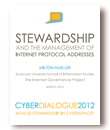 |
Milton Mueller is Professor at Syracuse University School of Information Studies, USA. Mueller received his Ph.D. from the University of Pennsylvania’s Annenberg School in 1989. Currently, he is doing research on IP addressing policy, the policy implications of Deep Packet Inspection technology and the security governance practices of ISPs.
download PDF
|
Dr. Thomas Rid – Subversion and Stewardship
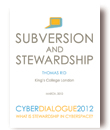 |
Dr. Thomas Rid is a Reader in War Studies at King’s College London. In 2009/2010, Rid was a visiting scholar at the Hebrew University and the Shalem Center in Jerusalem. From 2006 to 2009 he worked at the Woodrow Wilson Center and the RAND Corporation in Washington, and at the Institut français des relations internationales in Paris. Rid wrote his first book and thesis at the Berlin-based Stiftung Wissenschaft und Politik, Germany’s major government-funded foreign policy think tank. Rid holds a PhD from the Humboldt-Universität zu Berlin. He has published three books, Understanding Counterinsurgency (Routledge 2010, co-edited with Tom Keaney), War 2.0 (Praeger 2009, with Marc Hecker, translated into Mandarin by the People’s Liberation Army Press), and War and Media Operations (Routledge 2007). More at thomasrid.org.
download PDF
|











